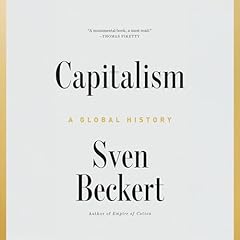
Oceans of Grain
How American Wheat Remade the World
No se pudo agregar al carrito
Add to Cart failed.
Error al Agregar a Lista de Deseos.
Error al eliminar de la lista de deseos.
Error al añadir a tu biblioteca
Error al seguir el podcast
Error al dejar de seguir el podcast
 Exclusivo para miembros Prime: ¿Nuevo en Audible? Obtén 2 audiolibros gratis con tu prueba.
Exclusivo para miembros Prime: ¿Nuevo en Audible? Obtén 2 audiolibros gratis con tu prueba.Compra ahora por $20.56
-
Narrado por:
-
Jason Arnold
A revelatory global history shows how cheap American grain toppled the world’s largest empires
To understand the rise and fall of empires, we must follow the paths traveled by grain—along rivers, between ports, and across seas. In Oceans of Grain, historian Scott Reynolds Nelson reveals how the struggle to dominate these routes transformed the balance of world power.
Early in the nineteenth century, imperial Russia fed much of Europe through the booming port of Odessa. But following the US Civil War, tons of American wheat began to flood across the Atlantic, and food prices plummeted. This cheap foreign grain spurred the rise of Germany and Italy, the decline of the Habsburgs and the Ottomans, and the European scramble for empire. It was a crucial factor in the outbreak of the First World War and the Russian Revolution.
A powerful new interpretation, Oceans of Grain shows that amid the great powers’ rivalries, there was no greater power than control of grain.
Scott Reynolds Nelson is the UGA Athletics Association professor of the humanities at the University of Georgia. He is a Guggenheim fellow and the author of five books, including Steel Drivin’ Man, which received the Merle Curti Social History Award and the National Award for Arts Writing. Nelson lives in Athens, Georgia.
©2022 Scott Reynolds Nelson (P)2022 Spotify AudiobooksLos oyentes también disfrutaron:




















Las personas que vieron esto también vieron:


Grain plays critical role in growth of civilization and urbanization
Se ha producido un error. Vuelve a intentarlo dentro de unos minutos.
The analysis of the domestic and international dimensions of grain was very enlightening.
The US civil war, the opening of the plains to the expansions of Katharina the Great and the role of grain merchants in the run up to WW1 was something I had not heard before.
5 star across the board.
Food = power
Se ha producido un error. Vuelve a intentarlo dentro de unos minutos.
Surprisingly great book
Se ha producido un error. Vuelve a intentarlo dentro de unos minutos.
Not so great
Se ha producido un error. Vuelve a intentarlo dentro de unos minutos.
I was hesitant from the introduction - the introduction spoke of modern Odessa, but never gave us a breakdown of what to expect. What eras does the book cover? Places? Grain types? Does the author have preferred sources? A goal? Why grain?
None of this was included.
The title claims 10,000 years of history; I expected to start with an early farming cradle: Turkey, China, the fertile crescent. Instead it was Ukraine, presented as a poetic, conceptual sketch. Then came comments about Mongols, Russia, quotes about Greek mythology, and the importance of controlling the Bosporus. It was neither chronological nor specific to place.
It continued to skip around around. Black Death, the ancient Black Sea peoples, Byzantine, Rome. We were told that the Black Sea stopped importing massive quantities of grain, but not that Rome was now supplied by Sicily then Egypt. He commented on the criticality of grain trade to empires, but not on the impact the Abbasid conquest of Egypt had on Constantinople.
We raced through the middle ages with a few comments on linguistic relationships between power and bread and then were suddenly talking about Catherine the Great and the Americas.
That's when I stopped. The academic chapter titles couldn't hide the fact that this is not an academic work and the sprinkling of cool factoids couldn't make up for the lack of coherency.
Poor history told poorly
Se ha producido un error. Vuelve a intentarlo dentro de unos minutos.


